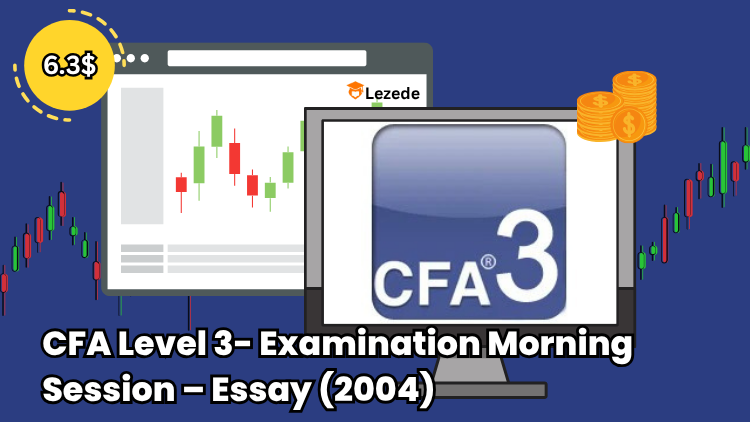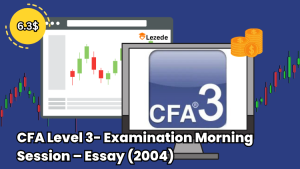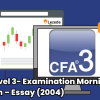Free Download CFA Level 3- Examination Morning Session – Essay (2004)
Check content proof, now:
Review of CFA Level 3 Examination Morning Session – Essay (2004)
The CFA Level 3 exam represents a significant milestone for finance professionals on the path to earning the Chartered Financial Analyst designation. The essay-based morning session is specifically crafted to measure candidates’ capacity to apply and integrate their extensive knowledge in practical settings. This review explores the layout, subject matter, and preparation strategies related to the 2004 CFA Level 3 morning essay exam.
Understanding the CFA Level 3 Morning Session
The Level 3 morning exam primarily features constructed-response items, often referred to as essay questions. These differ from multiple-choice sections by requiring detailed, well-organized written responses based on provided prompts. In 2004, this session was structured to assess not just candidates’ knowledge depth, but also their ability to articulate intricate financial ideas with clarity.
Purpose and Objectives
The essay portion serves to evaluate several key competencies:
-
Knowledge Integration: Bringing together various components of the CFA curriculum to respond to complex financial situations.
-
Practical Application: Demonstrating the real-world usage of investment theories.
-
Analytical Thinking: Interpreting financial data to support sound judgments.
-
Clear Communication: Presenting concepts precisely and effectively within exam constraints.
Structure of the 2004 Morning Session
The 2004 CFA Level 3 morning session was carefully designed to cover a wide range of advanced investment topics. This portion included a series of essay questions, each worth a specific number of points, adding up to a maximum of 180 points for the section.
Composition of Essay Questions
Each question focused on significant curriculum areas, ensuring a holistic evaluation of the candidate’s understanding. Commonly featured topics included:
-
Asset Allocation: Methods for structuring investment portfolios to balance risk and return.
-
Portfolio Management: Strategies to create and maintain portfolios aligned with clients’ financial objectives.
-
Ethical Guidelines: Applying the CFA Code of Ethics and Standards in diverse scenarios.
-
Performance Evaluation: Measuring results using suitable benchmarks and metrics.
-
Investment Fundamentals: Core principles guiding investment strategy decisions.
Evaluation Criteria
Essay responses are graded using a point-based rubric, with each question assigned varying weights. Important grading components include:
-
Clarity: Information should be logically and coherently presented.
-
Accuracy: Answers must be correct and satisfy all parts of the question.
-
Completeness: A full response that addresses every element of the prompt.
Detailed Analysis of a Typical Essay Question
Candidates may face multi-part questions, requiring careful reading and organization. For instance, a prompt might ask for “one weakness” in the strategies of several companies. In such cases, answers should be clearly divided and each point distinctly explained.
Example Scenario
Prompt: “Discuss one weakness for each of the following companies in their current investment strategies.”
Response Structure:
Company A:
-
Identify one specific weakness.
-
Offer a concise explanation to support your point.
Company B:
-
State the weakness clearly.
-
Justify it with a brief rationale.
Company C:
-
Mention the identified weakness.
-
Provide a short supporting explanation.
Scoring the Response
Each section of the response is scored based on its clarity, logic, and how well it aligns with the question’s requirements. Strong answers are those that are direct, well-supported, and neatly structured.
Common Topics in the 2004 Exam
Topics from the 2004 CFA Level 3 morning exam were likely consistent with ongoing themes in the curriculum, emphasizing practical use of financial theories and ethical responsibilities. Notable themes included:
Portfolio Management
Candidates were likely asked to manage or develop portfolios based on client profiles, risk tolerance, and economic factors. Potential tasks included:
-
Creating asset allocation frameworks.
-
Modifying portfolios based on macroeconomic shifts.
-
Assessing how diversification affects returns.
Performance Measurement
Evaluating investment outcomes is a major element of the test. Questions could include:
-
Calculating and explaining performance measures.
-
Benchmark comparisons.
-
Attributing sources of returns.
Ethical Considerations
The importance of ethics remains central in the CFA exams. Candidates might be presented with:
-
Situations involving ethical conflicts.
-
Scenarios needing application of ethical principles.
-
Evaluations of professional conduct standards.
Investment Decision-Making
Candidates may be required to validate their investment recommendations with thoughtful analysis, such as:
-
Weighing various investment options.
-
Assessing macroeconomic influences.
-
Making allocation choices based on client profiles.
Preparing for the Exam: Strategies and Tips
To succeed in the essay section of Level 3, candidates need focused preparation and strategy. Key practices include:
Practice with Past Essay Questions
Working through previous essay questions is invaluable. Benefits include:
-
Recognizing recurring themes and question structures.
-
Learning how to format strong responses.
-
Pinpointing weak spots for further review.
Time Management
Efficient use of time is vital during the exam. Simulated practice helps with:
-
Distributing time sensibly across questions.
-
Avoiding excessive time on difficult questions.
-
Enhancing response speed without reducing quality.
Structured Response Techniques
Organized answers are easier to follow and score. Recommended format includes:
-
Introduction: Summarize the question or key issue.
-
Body: Systematically respond to each sub-question.
-
Conclusion: Recap the main points or suggest next steps, where appropriate.
Clarity and Precision
Strong writing skills can elevate responses. Tips include:
-
Use direct and precise language.
-
Avoid overly technical or irrelevant jargon.
-
Ensure each line serves the overall response.
Focus on Key Concepts
Centering answers around fundamental principles helps ensure they remain relevant and insightful. Candidates should:
-
Determine core issues in each prompt.
-
Apply appropriate theories to support their arguments.
-
Show depth through thoughtful reasoning.
Practical Applications and Real-World Relevance
The morning session essays are designed to simulate real investment challenges, gauging candidates’ ability to apply theory in practice.
Scenario Analysis
Realistic case studies require:
-
Interpreting actual financial data and conditions.
-
Making informed decisions based on robust analysis.
-
Supporting answers with logical financial reasoning.
Decision-Making Justification
Candidates must go beyond selecting a strategy—they must defend it. This involves:
-
Displaying critical analysis and evaluative thinking.
-
Considering multiple approaches and choosing wisely.
-
Clearly explaining the reasoning behind decisions.
Integration of Ethical Standards
Incorporating ethical thinking is essential. Candidates should:
-
Identify ethical pitfalls in case studies.
-
Apply professional ethical standards effectively.
-
Demonstrate a commitment to integrity and ethical judgment.
Leveraging Technology and Resources
Using study materials efficiently can make a significant difference in preparation.
CFA Institute Materials
Resources provided by the CFA Institute include:
-
Comprehensive textbooks covering the entire syllabus.
-
Practice exams and sample essay questions.
-
Online forums and webinars for group learning.
Third-Party Study Aids
External tools like prep programs and condensed guides can offer extra insight and clarity on complex subjects.
Writing Practice
As essay responses form a core part of the exam, consistent writing practice is essential. Tips include:
-
Write regularly and review sample answers.
-
Get feedback to refine structure and clarity.
-
Develop a repeatable, effective approach to tackling questions.
Conclusion
Excelling in the CFA Level 3 essay section demands not only strong subject mastery but also structured preparation and writing discipline. The 2004 exam reflects the CFA Institute’s emphasis on real-world application, ethical rigor, and deep analytical skills. By mastering the exam structure, practicing extensively, managing time wisely, and refining writing ability, candidates can significantly improve their performance. Success in this section does more than earn a credential—it prepares future financial professionals for the complex challenges of the investment industry.












